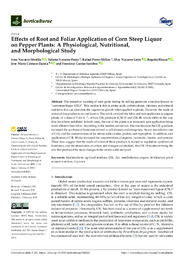Título :
Effects of Root and Foliar Application of Corn Steep Liquor on Pepper Plants: A Physiological, Nutritional, and Morphological Study |
Autor :
Navarro Morillo, Iván 
Navarro-Pérez, Valeria
Perez-Millan, Rafael
Navarro-León, Eloy 
Blasco León, Begoña 
Cámara-Zapata, José-María 
Garcia-Sanchez, Francisco  |
Editor :
MDPI |
Departamento:
Departamentos de la UMH::Física Aplicada |
Fecha de publicación:
2023-02-07 |
URI :
https://hdl.handle.net/11000/33467 |
Resumen :
The industrial washing of corn grain during its milling generates a residue known as “corn steep liquor (CSL)”. This residue is rich in amino acids, carbohydrates, vitamins, and mineral nutrients that can stimulate the vegetative growth when applied to plants. However, the mode of action of this product is not yet known. This work involved the foliar and root application to pepper plants, at a dose of 5 mL L−1, of two CSL products (CSL-H and CSL-B), which differ in the way they have been stabilized. In both cases, the size of the plants was increased, root application being more efficient than foliar. According to the studies carried out, this was because the CSL products increased the synthesis of hormones related to cell division and elongation, the net assimilation rate of CO2, and the concentrations of the amino acids alanine, proline, and tryptophan. In addition, root application of CSL-H also increased the concentrations of arginine, isoleucine, leucine, and cysteine. These data suggest that the mode of action of these products is related to regulation, synthesis of hormones, and the stimulation of carbon and nitrogen metabolism, the CSL-H treatment being the one that produced the most changes in the amino acids analyzed
|
Palabras clave/Materias:
Biostimulants
Agrifood residues
CSL
Zea
Metabolomics
Organic fertilization
Plant mineral nutrition
Capsicum |
Tipo de documento :
info:eu-repo/semantics/article |
Derechos de acceso:
info:eu-repo/semantics/openAccess
Attribution-NonCommercial-NoDerivatives 4.0 Internacional |
DOI :
https://doi.org/10.3390/horticulturae9020221 |
Publicado en:
Horticulturae 2023, 9(2) |
Aparece en las colecciones:
Artículos - Física Aplicada
|

 La licencia se describe como: Atribución-NonComercial-NoDerivada 4.0 Internacional.
La licencia se describe como: Atribución-NonComercial-NoDerivada 4.0 Internacional.
.png)